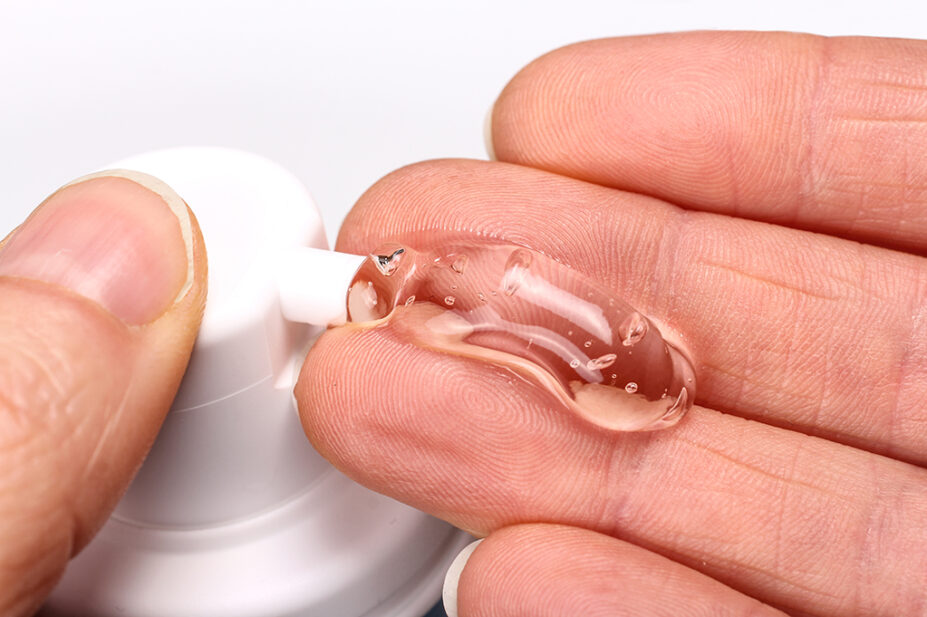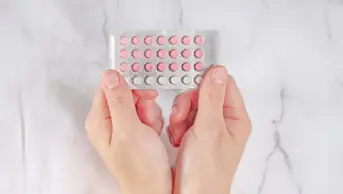
Shutterstock.com
The number of women in England prescribed testosterone gel on the NHS has increased by around ten-fold since November 2015, when guidelines first recommended the treatment for low sexual desire, data analysis by The Pharmaceutical Journal has revealed.
The NHS data, obtained through a freedom of information request, revealed that 4,675 women aged 50 years and over obtained testosterone gel using an NHS prescription in November 2022, a sharp increase from 429 women in November 2015.
The number of women aged 49 years and under receiving testosterone gel also increased, from 228 in November 2015 to 2,913 in November 2022 (see Figure).
In contrast, the data show that NHS prescribing of testosterone gel in men has increased by only 33% in both age groups during the same seven-year period.
The data show that these rates in both age groups began to rise more steeply in early 2021, when the first of UK television personality Davina McCall’s menopause documentaries was aired on Channel 4 and as general awareness of menopausal symptoms was increasing.
The biggest monthly rise came in May 2022, when McCall’s second documentary was aired, which included information about testosterone treatment, with a 52% rise in women aged 50 years and over taking testosterone that month, compared with April 2022.
The first National Institute for Health and Care Excellence guideline on diagnosing and managing menopause, published in November 2015, states that clinicians should only consider testosterone supplementation for women with low libido if hormone replacement therapy alone is not effective. However, experts say they are concerned the treatment may be being used inappropriately.
Paula Briggs, a consultant in sexual and reproductive health at Liverpool Women’s NHS Foundation Trust and chair of the British Menopause Society (BMS), said there is an issue in the UK with misinformation around the potential benefits of testosterone.
“Women are being led to believe that it’s the missing piece of the jigsaw, that it’s going to be the solution to their relationship problems, and I think we have to be much more scientific about how that information is provided for women,” she said.
“It’s coming from celebrities and politicians, and that’s not necessarily appropriate.”
Briggs emphasised that she is keen that women have a proper risk assessment and that they are managed appropriately.
“I actually don’t think that’s happening and I think that’s one of the reasons why there’s been a huge increase in testosterone prescribing,” she said.
“We don’t have the evidence to say that [testosterone] improves any of the other symptoms that women, I think, sometimes are requesting treatment for,” said Briggs, which include cognition, mood, energy and musculoskeletal health. She added that if treatment has not had any significant beneficial effects by six months, then women should stop using it.
Briggs also noted that most of the patients waiting to be seen in her clinic are waiting for testosterone. “If your menopause clinic is full of women waiting for testosterone, then other women — for example, women who have had treatment for cancer — might not be seen as quickly as they probably should be.”
BMS guidance on testosterone replacement in menopause, published in December 2022, says that testosterone supplementation “should only be considered in women who complain of low sexual desire after a biopsychosocial approach has excluded other causes such as relationship, psychological and medication-related hypoactive sexual desire disorder (HSDD)”.
Susan Davis, an Australian endocrinologist, who is an adviser to the NHS menopause group steering committee, said the increase in prescribing reflects the recognition that there is a role for testosterone therapy for some women. “However, we don’t know why the testosterone is being prescribed. Evidence supports testosterone for postmenopausal women with low libido and associated distress, but not for premenopausal women.
“We don’t know if the women under 49 [years] receiving testosterone are pre- or postmenopausal — if mainly premenopausal, this is concerning as evidence to support this is lacking.”
In 2019, an international panel of organisations published a position statement on use of testosterone in women that concluded the only evidence-based indication for testosterone therapy for women is for the treatment of HSDD, with available data supporting a moderate therapeutic effect in postmenopausal women.
The panel highlighted the “pressing need for more research into testosterone therapy for women and the development and licensing of products indicated specifically for women”.
There are currently no licensed testosterone preparations for women in the UK, leading NHS clinicians to prescribe products licensed for men off-label at physiological doses for women. This can be problematic because women often have to estimate the quantity needed and patient information leaflets are inappropriate.
In 2020, AndroFeme cream (1% testosterone; Lawley Pharmaceuticals) was licensed for female use in Australia and is currently imported to the UK for private use under a special Medicines and Healthcare products Regulatory Agency (MHRA) licence.
Michael Buckley, chief executive of Lawley Pharmaceuticals, told The Pharmaceutical Journal that he is preparing to submit a marketing authorisation application for AndroFeme to the MHRA “in the near future”.
Data reported in this story are based on information captured during prescription processing for prescriptions prescribed in England and dispensed in the community.
Additional reporting by Claire Ainsworth
1 comment
You must be logged in to post a comment.



If comparing numbers, compare apples to apples, what is happening here is the data is getting portrayed differently, using numbers for women’s group and then percentages for men. The research supports testosterone for energy, fatigue, low libido, for both sexes, it should be given to both and follow up blood work on both. The research is so far behind, if women have been informed of risks, have them sign a waiver and then use their findings to help research this topic. By keeping women low energy, low libido and fatigued, it only supports keeping them ill and running from doctor to doctor for help, racking up more medical bills for them and their families.
“The number of women aged 49 years and under receiving testosterone gel also increased, from 228 in November 2015 to 2,913 in November 2022 (see Figure).
In contrast, the data show that NHS prescribing of testosterone gel in men has increased by only 33% in both age groups during the same seven-year period.”